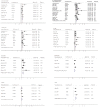Glycosylated hemoglobin in relationship to cardiovascular outcomes and death in patients with type 2 diabetes: a systematic review and meta-analysis
- PMID: 22912709
- PMCID: PMC3415427
- DOI: 10.1371/journal.pone.0042551
Glycosylated hemoglobin in relationship to cardiovascular outcomes and death in patients with type 2 diabetes: a systematic review and meta-analysis
Abstract
Background: Chronic hyperglycemia in type 2 diabetes increases the risk of microvascular events. However, there is continuing uncertainty about its effect on macrovascular outcomes and death. We conducted a meta-analysis of prospective studies to estimate the association of glycosylated hemoglobin level with the risk of all-cause mortality and cardiovascular outcomes among patients with type 2 diabetes.
Methodology/principal findings: We systematically searched the MEDLINE database through April 2011 by using Medical Subject Heading search terms and a standardized protocol. We included prospective cohort studies that reported data of glycosylated hemoglobin level on the risk of incident cardiovascular events and all-cause mortality. Relative risk estimates (continuous and categorical variables) were derived or abstracted from each cohort study. Twenty six studies were included in this analysis with a mean follow-up rang of 2.2-16 years. The pooled relative risk associated with a 1% increase in glycosylated hemoglobin level among patients with type 2 diabetes was 1.15 (95% CI, 1.11 to 1.20) for all-cause mortality, 1.17 (95% CI, 1.12 to 1.23) for cardiovascular disease, 1.15 (95% CI, 1.10 to 1.20) for coronary heart disease, 1.11 (95% CI, 1.05 to 1.18) for heart failure, 1.11 (95% CI, 1.06 to 1.17) for stroke, and 1.29 (95% CI, 1.18 to 1.40) for peripheral arterial disease, respectively. In addition, a positive dose-response trend existed between glycosylated hemoglobin level and cardiovascular outcomes.
Conclusions/significance: Chronic hyperglycemia is associated with an increased risk for cardiovascular outcomes and all-cause mortality among patients with type 2 diabetes, likely independently from other conventional risk factors.
Conflict of interest statement
Figures


References
-
- Zhang P, Zhang X, Brown J, Vistisen D, Sicree R, et al. (2010) Global healthcare expenditure on diabetes for 2010 and 2030. Diabetes Res Clin Pract 87: 293–301. - PubMed
-
- Coutinho M, Gerstein HC, Wang Y, Yusuf S (1999) The relationship between glucose and incident cardiovascular events. A metaregression analysis of published data from 20 studies of 95,783 individuals followed for 12.4 years. Diabetes Care 22: 233–240. - PubMed
-
- Laakso M (1999) Hyperglycemia and cardiovascular disease in type 2 diabetes. Diabetes 48: 937–942. - PubMed
Publication types
MeSH terms
Substances
LinkOut - more resources
Full Text Sources
Other Literature Sources
Medical
Miscellaneous

